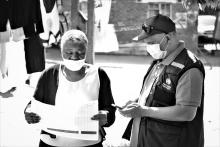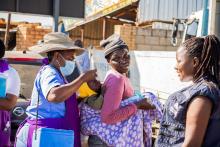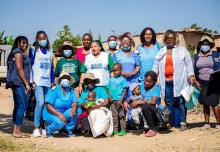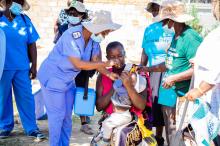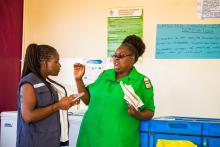Zimbabwe conducts third round of polio vaccination campaign
By Vivian Mugarisi
Harare, Zimbabwe – The detection of wild polio virus (WPV1) outside Pakistan and Afghanistan, the world’s two remaining endemic countries, underscores the importance of prioritizing polio immunization activities in countries to stop transmission and prevent future instances of importation. Malawi and Mozambique reported polio outbreaks in 2022, triggering polio vaccination campaigns in Southern Africa as part of the region’s comprehensive response. Zimbabwe joined the regional campaigns, carrying out two rounds in 2022 to ensure children are protected. The country recently conducted its third round, reaching over 2,4 million children under five years. This translate to over 90% coverage as 2,6 million children were being targeted during the campaign.
The achievement by the Government of Zimbabwe was attained with the help of the partners in the Global Polio Eradication Initiative (GPEI) — the Bill and Melinda Gates Foundation, the Centers for Disease Control and Prevention (CDC), the United Nations Children's Fund (UNICEF), Rotary International, and the World Health Organization (WHO).
“The door-to-door approach works well for us because we keep on doing our chores while having our children vaccinated,” said Ernerest Chibharu, at Tagarika Flats in Mbare, after getting her niece vaccinated in the comfort of her own home.
The door-to-door implementation eased the financial burden on parents to transport their children to health facilities for vaccination. The approach has also enhanced peer mobilization within communities. In addition, the visits by health care workers to market-places, bus termini amongst other strategic points such as schools and religious centres made access to vaccination services easier, even for the busy parents.
Engagement of Community Health Workers (CHWs), religious, political and community leaders at every level has always been critical to the success of the campaigns for mobilizing communities. They have acted as vaccination champions and this has been a game changer in mobilization of caregivers not only for polio, but all vaccine preventable diseases. Through the power of partnerships, extra vehicles to take teams to hard-to-reach areas were provided by partners such as JF Kapnek Trust, Population Service International and Zvandiri in some Provinces such as Masvingo.
In Bere Village, Masvingo District, Ward Councillor Mr Tawanda Dube led a vaccination team to families who usually shy away from participating in vaccination activities due to religious reasons. After education and engagement at household level, 10 children from 3 households were vaccinated.
He said, “I am willing to use my resources to assist my community and ensure every child is protected against polio. I heard on radio that some children in our neighboring countries are paralyzed due to polio and it would be heartbreaking to see children suffering the same as polio is preventable.”
The District Nursing Officer for Chivi, Mrs Constance Chitewure said community engagements during the vaccination campaigns are strengthening participation and empowering communities with the right information to be responsible for their children’s health.
“All health facilities conducted community based micro-plans, which included creating a database of villages and for under five children within their catchment area. The planning meetings were at the village head’s place to bolster community participation,” she noted.
The database created will be used to guide implementation of other programmes beyond this campaign, strengthen routine immunization provision and enhance access through improved planning.
WHO supported planning, preparations, implementation and coordination of the vaccination campaign as well as preparedness assessments. In addition, WHO supported surveillance strengthening activities to ensure increased sensitivity of the surveillance system as well as to facilitate early detection of any polioviruses that might be. WHO and partners have worked to expand Acute Flaccid Paralysis (AFP) surveillance while facilitating the introduction of environmental surveillance in Harare. AFP surveillance aims to detect the physical symptoms of polio, including paralysis and mobility issues, while environmental surveillance seeks to find samples of wastewater containing traces of polio.
“The number of children reached during these three rounds of polio campaigns is encouraging and with increased immunizations and continued commitment of health leaders and partners, we are confident that we will soon see an end to all forms of polio in the region,” Dr Khalid Abdelrahim, GPEI Coordinator in Zimbabwe.
The poliovirus is highly infectious and largely affects children younger than five years. The disease can cause lifelong paralysis and can be prevented only by immunization. Zimbabwe has made notable strides on Poliomyelitis Eradication. The last case of Poliomyelitis in the country was in 1989 and the country was certified free of Poliomyelitis in 2005. Zimbabwe has a robust routine immunization programme, with an achievement of about 90% coverage for Poliomyelitis vaccination in recent years. The polio vaccine is given at 6, 10 and 14 weeks as part of routine immunization programme, free of charge and at all health institutions across the country.




